Hamburger Hill (1987)
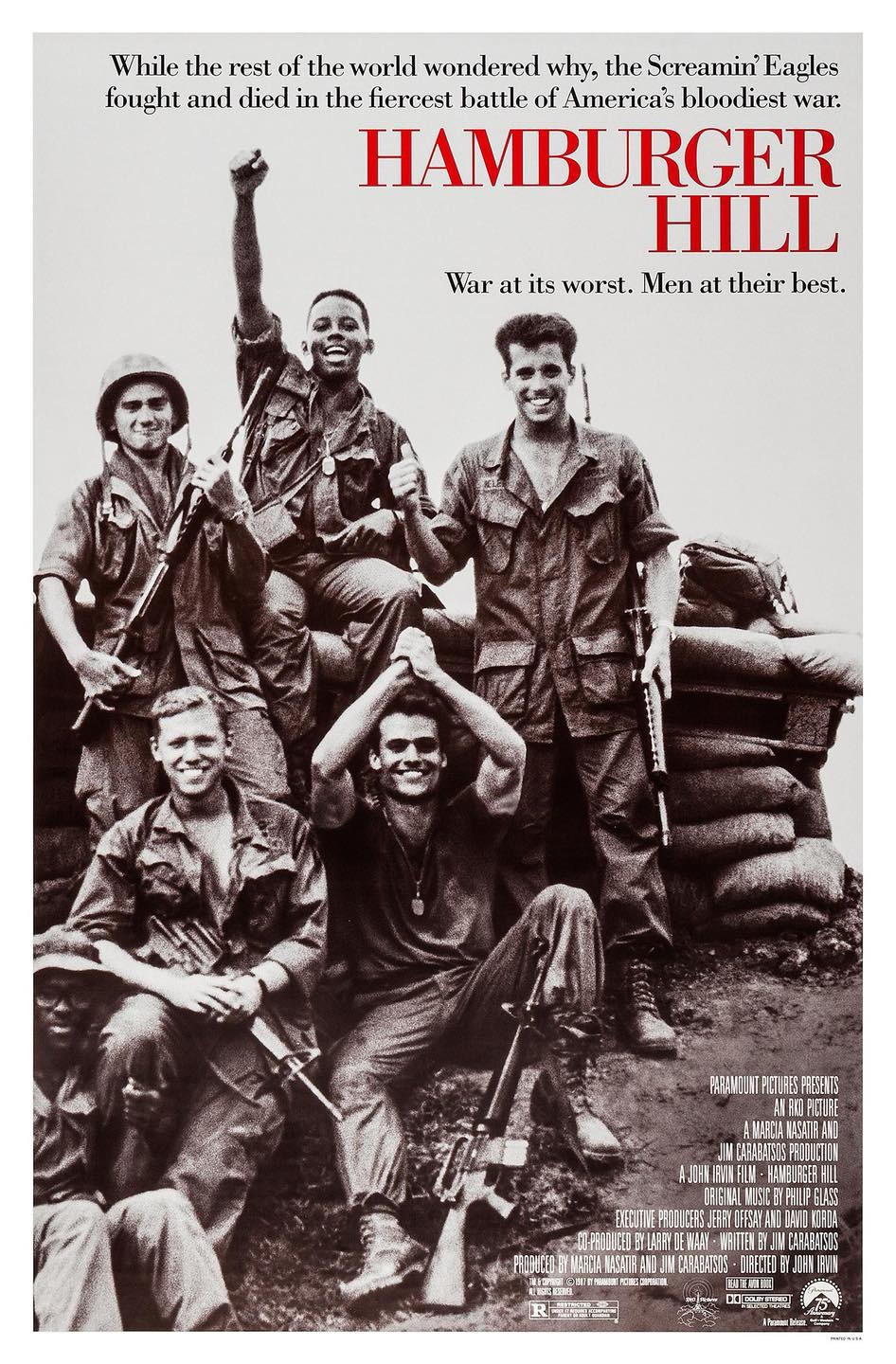
Overview
Hamburger Hill is a gritty, intense war film released in 1987, directed by John Irvin and based on the real-life battle of Hamburger Hill during the Vietnam War. The film chronicles the 10-day struggle between American forces and North Vietnamese soldiers for control of a heavily fortified hill in the dense jungles of Vietnam. Known for its realism and unflinching portrayal of the horrors of combat, Hamburger Hill stands as one of the more harrowing films in the Vietnam War genre, eschewing glorification in favor of a raw, unvarnished look at the physical and psychological toll of war.
Suggested videos for you:
Plot Summary
The film centers on a group of American soldiers, primarily members of the 101st Airborne Division, who are tasked with capturing a strategically significant hill, dubbed “Hamburger Hill” by the men due to the brutal and grinding nature of the battle. The soldiers, drawn from different backgrounds and with differing views on the war, are thrown together in the struggle, facing not only the enemy but the moral and emotional cost of combat.
The narrative focuses on the camaraderie and individual stories of the soldiers as they endure the relentless assault on the hill, facing grueling conditions, heavy casualties, and the threat of death. The film avoids a singular protagonist, instead offering a broad ensemble cast of characters, each struggling with the fear, confusion, and futility of war.
As the battle intensifies, the soldiers are pushed to their physical and emotional limits. The film’s focus is not on heroic actions but on the senseless violence, the cost of human life, and the psychological toll war takes on those involved. The soldiers’ personal moments, such as bonding with comrades and confronting the looming specter of death, are given equal weight to the fierce fighting, making Hamburger Hill a deeply human portrayal of war.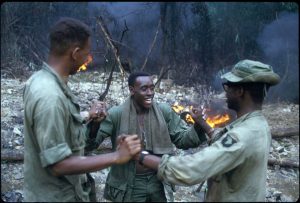
Realism and Combat Depiction
One of the standout aspects of Hamburger Hill is its commitment to realism. The battle sequences are intense, chaotic, and unrelenting, presenting the brutal nature of the conflict without glorifying it. The film does not shy away from showing the bloodshed, the disorientation, and the high cost of human life that comes with war. The constant barrage of mortar fire, the violence of close-quarter fighting, and the psychological strain on the soldiers all combine to create a harrowing and realistic depiction of combat.
In contrast to many earlier Vietnam War films, Hamburger Hill avoids turning the battle into a spectacle of heroism. There are no grand, cinematic moments where soldiers make miraculous saves or deliver stirring speeches. Instead, the film depicts war as a grim and grinding ordeal, where men are reduced to mere cogs in a vast, impersonal machine. The film’s unromantic portrayal of war serves to underscore its theme: the futility and senselessness of the battle for the hill, which ultimately yields little strategic value.
Themes
At its core, Hamburger Hill is a meditation on the psychological and emotional costs of war. The film explores themes of camaraderie, sacrifice, fear, and the loss of innocence. The soldiers, despite their varied backgrounds and personalities, are united by the shared experience of battle, and their relationships form the emotional backbone of the film. As they face death at every turn, their fears and personal struggles become increasingly palpable, giving the audience a deeper understanding of the emotional toll of combat.
Another key theme is the futility of war. The battle for Hamburger Hill, while depicted as a grueling and heroic struggle, ultimately has little strategic impact on the course of the Vietnam War. The hill is captured only to be abandoned shortly after, emphasizing the senselessness of the conflict and the immense human cost for minimal gain. This theme of futility is reinforced throughout the film, with the soldiers themselves questioning the purpose of the war and their involvement in it.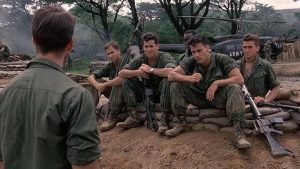
Character Development and Performances
While the film is an ensemble piece, there are standout performances that elevate Hamburger Hill. The cast includes notable actors like Don Cheadle, Dylan McDermott, and Steven Weber, all of whom deliver strong performances that convey the emotional weight of their characters’ experiences. The film’s strength lies in how it portrays each soldier as an individual, allowing their personalities and struggles to shine through amidst the chaos of war.
Dylan McDermott plays the role of a lieutenant whose leadership and decision-making are tested under pressure, while Don Cheadle portrays a soldier grappling with fear and the loss of his comrades. The characters are not one-dimensional heroes or villains, but rather men who are shaped by their circumstances and forced to confront the horrors of war in their own ways.
The lack of a single protagonist allows for a broader exploration of the diverse backgrounds and motivations of the soldiers, contributing to a deeper emotional resonance. These soldiers are not simply cannon fodder; they are individuals, each with their own hopes, fears, and regrets, making their collective suffering all the more poignant.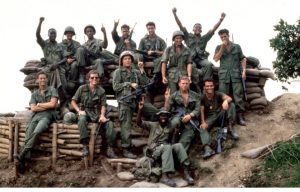
Pacing and Structure
Hamburger Hill is a fairly straightforward film in terms of structure, but its pacing is deliberate, allowing for moments of introspection amidst the combat. While the battle scenes are harrowing and intense, the film also takes time to focus on the personal lives of the soldiers. These quieter moments of reflection provide a necessary counterbalance to the brutality of the combat and allow the audience to connect with the soldiers on a deeper level.
The film doesn’t rush through its action sequences; instead, it builds tension gradually, emphasizing the psychological and emotional toll of the prolonged battle. The final act, in particular, is deeply emotional as the soldiers reflect on the futility of their struggle and the sacrifices made in the name of war.
Reception and Legacy
Upon its release, Hamburger Hill received a mixed-to-positive reception from critics. While some praised the film for its gritty realism and its focus on the human cost of war, others felt that it did not offer enough in terms of character depth or plot complexity. Nevertheless, the film has garnered a reputation over time as one of the more authentic and emotionally resonant depictions of the Vietnam War.
It stands in contrast to other, more famous war films like Apocalypse Now (1979) and Platoon (1986), which focus more on the psychological and philosophical aspects of the war. Hamburger Hill, on the other hand, is focused on the immediate, visceral experience of combat, offering an unvarnished and stark look at the soldiers’ struggle.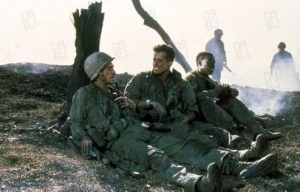
Final Thoughts
Hamburger Hill is a powerful, sobering war film that offers a realistic and unflinching look at the horrors of the Vietnam War. Its raw portrayal of combat, combined with a strong ensemble cast and a focus on the emotional and psychological toll of war, makes it one of the more thought-provoking films in the Vietnam War genre. While not as widely acclaimed as some of its contemporaries, it remains a deeply effective and poignant exploration of the human cost of war, making it a must-watch for those interested in war cinema that does not shy away from its brutal truths.











